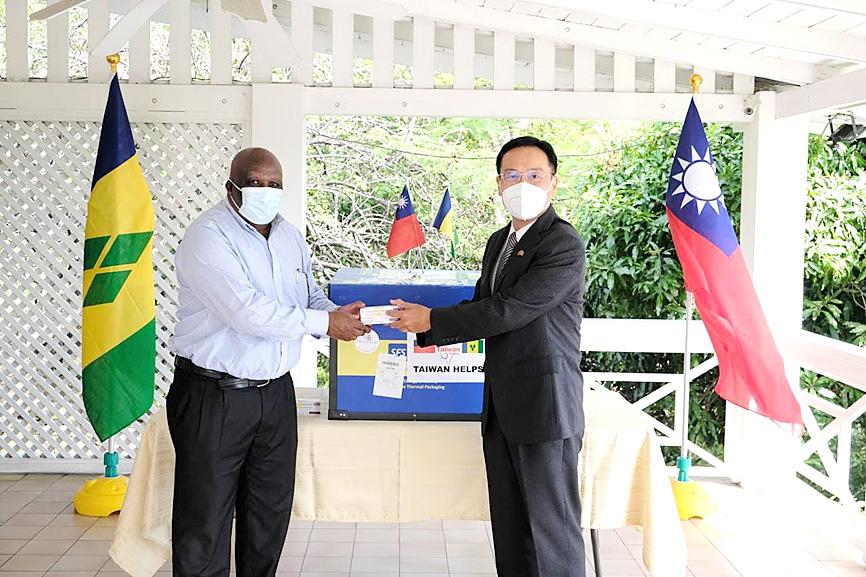Taiwan has donated 10,000 doses of the AstraZeneca COVID-19 vaccine to two Caribbean allies to help them combat the pandemic, the Ministry of Foreign Affairs said yesterday.
Taiwan’s ambassadors to Saint Lucia and Saint Vincent and the Grenadines donated the AstraZeneca doses to the local health ministers on Thursday and on Monday respectively, the ministry said in a statement.
The vaccine doses would support the health and welfare of the Caribbean nations’ residents, the ministry said, adding that it had been confirmed that Taiwan had enough AstraZeneca doses for its own use.

Photo courtesy of the Ministry of Foreign Affairs via CNA
The Central Epidemic Command Center (CECC) last week said that Taiwan has 2.5 million doses of the AstraZeneca vaccine that are to expire in May.
NEW CASES
In related news, the CECC yesterday reported 53 new cases of COVID-19 — eight locally transmitted and 45 that originated overseas — but no new deaths from the disease.
Two of the new domestic patients are linked to a cluster in Yilan County, while the other six are connected to a cluster involving a Kaohsiung family and a tour group, the CECC said.
In terms of vaccination status, six of them had received either two or three doses of a COVID-19 vaccine, one had received one dose of AstraZeneca and one is unvaccinated, it said.
Of the 45 imported cases, 18 tested positive upon arrival, it said, without giving details regarding their vaccination status.
The cluster in Yilan originated with a woman in her 50s who returned on Feb. 10 from the US, the center said.
The woman tested negative upon entry and on her seventh day of quarantine, and opted to spend the rest of the quarantine period at home, during which she tested positive.
Her older sister, who had helped to deliver food to her, subsequently tested positive, as did a coworker.
The two new cases linked to the cluster are family members who the woman’s sister had visited prior to testing positive.
Including the woman who returned from the US, the cluster has five cases, the center said, adding that the cluster involving the Kaohsiung family and a tour group now has 17.
It is highly likely that the cluster is connected to a different cluster infection in northern Taiwan, it said.
A patient in one cluster had visited the home of a patient in the other cluster, but the CECC said it has not yet been able to identify the original source of the clusters.
The center said that it is monitoring three clusters of unknown origin.
As of yesterday, Taiwan had confirmed 20,922 cases of COVID-19 since the emergence of the pandemic in late 2019, including 15,472 locally transmitted cases.
The number of fatalities in the nation resulting from COVID-19 remained at 853.

‘TAIWAN-FRIENDLY’: The last time the Web site fact sheet removed the lines on the US not supporting Taiwanese independence was during the Biden administration in 2022 The US Department of State has removed a statement on its Web site that it does not support Taiwanese independence, among changes that the Taiwanese government praised yesterday as supporting Taiwan. The Taiwan-US relations fact sheet, produced by the department’s Bureau of East Asian and Pacific Affairs, previously stated that the US opposes “any unilateral changes to the status quo from either side; we do not support Taiwan independence; and we expect cross-strait differences to be resolved by peaceful means.” In the updated version published on Thursday, the line stating that the US does not support Taiwanese independence had been removed. The updated

‘CORRECT IDENTIFICATION’: Beginning in May, Taiwanese married to Japanese can register their home country as Taiwan in their spouse’s family record, ‘Nikkei Asia’ said The government yesterday thanked Japan for revising rules that would allow Taiwanese nationals married to Japanese citizens to list their home country as “Taiwan” in the official family record database. At present, Taiwanese have to select “China.” Minister of Foreign Affairs Lin Chia-lung (林佳龍) said the new rule, set to be implemented in May, would now “correctly” identify Taiwanese in Japan and help protect their rights, the Ministry of Foreign Affairs said in a statement. The statement was released after Nikkei Asia reported the new policy earlier yesterday. The name and nationality of a non-Japanese person marrying a Japanese national is added to the

AT RISK: The council reiterated that people should seriously consider the necessity of visiting China, after Beijing passed 22 guidelines to punish ‘die-hard’ separatists The Mainland Affairs Council (MAC) has since Jan. 1 last year received 65 petitions regarding Taiwanese who were interrogated or detained in China, MAC Minister Chiu Chui-cheng (邱垂正) said yesterday. Fifty-two either went missing or had their personal freedoms restricted, with some put in criminal detention, while 13 were interrogated and temporarily detained, he said in a radio interview. On June 21 last year, China announced 22 guidelines to punish “die-hard Taiwanese independence separatists,” allowing Chinese courts to try people in absentia. The guidelines are uncivilized and inhumane, allowing Beijing to seize assets and issue the death penalty, with no regard for potential

‘UNITED FRONT’ FRONTS: Barring contact with Huaqiao and Jinan universities is needed to stop China targeting Taiwanese students, the education minister said Taiwan has blacklisted two Chinese universities from conducting academic exchange programs in the nation after reports that the institutes are arms of Beijing’s United Front Work Department, Minister of Education Cheng Ying-yao (鄭英耀) said in an exclusive interview with the Chinese-language Liberty Times (the Taipei Times’ sister paper) published yesterday. China’s Huaqiao University in Xiamen and Quanzhou, as well as Jinan University in Guangzhou, which have 600 and 1,500 Taiwanese on their rolls respectively, are under direct control of the Chinese government’s political warfare branch, Cheng said, citing reports by national security officials. A comprehensive ban on Taiwanese institutions collaborating or